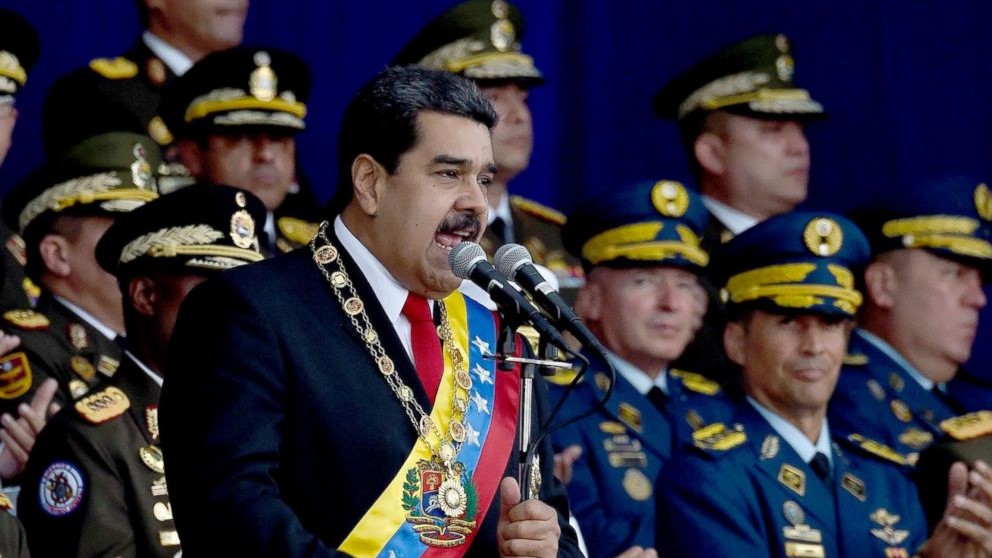Maduro survives assassination attempt
August 5, 2018 | Expert Insights

Venezuela’s president, Nicolás Maduro, has survived an apparent assassination attempt after what officials describe as drones armed with explosives detonated overhead during a speech he was making at a military event.
The drones, according to officials, were flown towards Maduro as he addressed soldiers in Caracas on Saturday.
Background
Nicolás Maduro Moros is the 63rd President of Venezuela. He previously served under President Hugo Chávez as Minister of Foreign Affairs from 2006 to 2013 and as Vice President of Venezuela from 2012 to 2013.
Starting off as a bus driver, Maduro rose to become a trade union leader before being elected to the National Assembly in 2000. He was described during this time as the most capable administrator and politician of Chávez's inner circle. After Chávez's death was announced on 5 March 2013, Maduro assumed the powers and responsibilities of the President. He won a new six-year term in May but his main rivals disavowed the election and alleged massive irregularities.
Last year, rogue police officer Óscar Pérez hijacked a helicopter and fired at government buildings in what he said was an action against a dictator. Pérez was hunted down and killed by Venezuelan forces.
Analysis
Venezuelan President Nicolas Maduro dodged an apparent assassination attempt on Saturday, when drones armed with explosives detonated while he was delivering a speech to hundreds of soldiers being broadcast live on television, officials said.
The parade Mr Maduro attended was to mark the one-year anniversary of the Constitutional Assembly, a legislative body packed with Mr Maduro loyalists that arrogated powers from the opposition-ruled National Assembly. Mid-speech, Maduro and his wife, Cilia Flores, looked up at the sky and winced after hearing the sound of an explosion. The drones did not reach him, officials said, but it was not clear if they were shot down or exploded prematurely. Seven people were injured, the country’s information minister said.
The head of the assembly, Diosdado Cabello, tweeted that Mr Maduro and the assembled military chiefs had survived a “terrorist attack” he blamed on the opposition.
Mr Maduro has remained in power over Venezuela, a major oil exporting nation, despite a collapsing economy and a long-running political crisis that has seen his country isolated internationally from a crippling economic crisis.
Maduro suggested an initial investigation. It showed that Colombia and the US state of Florida, where many Venezuelan exiles live, were linked to the explosions. Speaking from the presidential palace two hours after the attack, he announced that those behind the attempt on his life had been captured. “I am alive and victorious,” the socialist president said in a bellicose televised address. “Everything points to the Venezuelan ultra-right in alliance with the Colombian ultra-right, and that the name of [Colombian president] Juan Manuel Santos is behind this attack.”
David Smilde, a senior fellow at the Washington Office on Latin America who has spent decades researching Venezuela, said the incident did not appear to be a staged attack by Maduro's government for political gain. The "amateurish" attack prompted embarrassing images of Maduro cut off mid-sentence with droves of soldiers running away in fear, making the president appear vulnerable, Smilde noted. Despite the optics, Smilde said he suspected that Maduro would nonetheless find a way to take advantage of it.
A spokesperson for Santos, who leaves office on Tuesday, quickly denied the allegations. “The president is focused on the baptism of his granddaughter and not on bringing down foreign governments,” the official said.
The two presidents have often sparred, with Santos regularly labelling his Venezuelan counterpart a dictator and saying he is leading his country into economic and political turmoil.
A little-known group called the "National Movement of Soldiers in T-shirts" claimed responsibility for the attack. In a series of posts on social media, the group said it had planned to fly two drones but that snipers shot them down.
Members of the media covering the event are said to have been detained, with one Associated Press photographer released hours after the chaos ensued, according to the website Crónica Uno.
Counterpoint
Venezuela's government routinely accuses opposition activists of plotting to attack and overthrow Maduro, who was recently elected to a new term in office in a vote decried by dozens of nations.
Firefighters at the scene disputed the government’s claim that the incident was an attack on Maduro’s life, claiming that it was instead caused by a gas tank explosion in a nearby apartment, the Associated Press reported.
Assessment
Our assessment is that Maduro routinely accuses opposition activists of plotting to attack and overthrow him and it’s hard to verify whether the attack was targeted on the President.








Comments